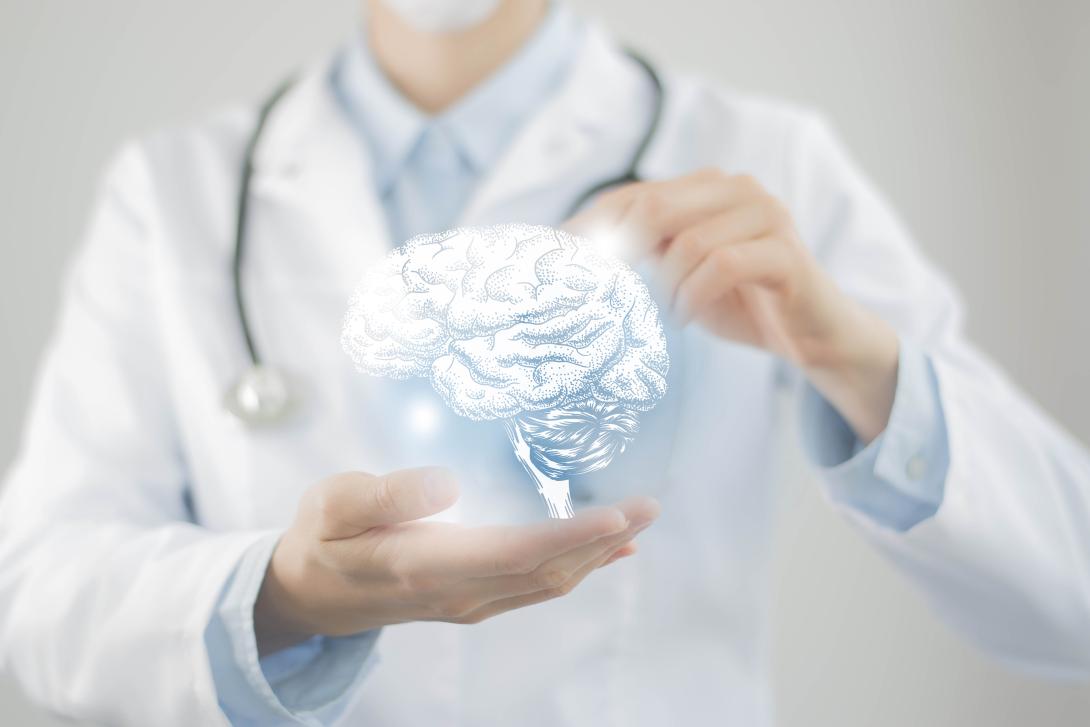
“Vascular lesions can trigger cognitive difficulties that have repercussions on the patient’s functional capacity”
Dr. Ana Malagelada Seckler, a specialist in Neurology at Institut Neurològic de Barcelona
What are the first signs of alarm that warn us about a possible degenerative disease?
Depending on the degenerative disease in question, we can detect, for example, changes in the cognitive sphere as memory loss, difficulty to find words and express themselves, a change in character or behaviour, greater indifference towards the surroundings, loss of empathy or greater apathy. We can also see physical changes, in the motility, loss of agility in movements or the appearance of abnormal movements such as shaking. The neurologist is the person who should evaluate and study whether the patient’s subjective complaints, their symptoms or the signs in the examination are those of physiological ageing or, to the contrary, they are tending towards a degenerative disease.
Why does cognitive deterioration and dementia occur?
If we are talking about microscopic changes that occur in the brain and that damage it, these are different in terms of the dementia in question, but, basically they consist of the deposit and progressive accumulation of abnormal proteins in the brain tissue, in the presence of inflammatory phenomena and in the deterioration of the small arteries that feed the brain. If we are referring to the origin of the dementia, we know that in some of the diseases, there is a clear genetic predisposition and in others, the presence of diseases such as diabetes, high blood pressure, high levels of cholesterol or bad habits such as smoking or drinking alcohol, an incorrect diet or physical inactivity all have an effect.
What factors are decisive for its appearance? Can it be avoided or delayed?
We must try to ensure that our metabolism, on the one hand, and our immune system, on the other, both enjoy good health; that is to say, that they function in an optimal way. To do this, it is essential to follow a healthy diet, to ensure the intake of all the necessary nutrients, and to avoid harmful foods, avoid obesity and obtain good digestive flora, which is a key component in our immune system. Exercise, both physical and cognitive, good quality sleep and a good state of mind are also very important factors. We must visit our GP regularly in order for them to help us to control our blood pressure, sugar and cholesterol in blood levels.
What role do genetics or inherited characteristics play in finally suffering from this type of pathologies?
Inheritance plays an important role in most dementias, although to variable degrees. It is more important when there is a history of dementia in first-degree relatives under the age of 65 years. In any event, we know that genetic inheritance is not, by a long chalk, always a determining factor, as the expression of our genetic information can be influenced by metabolic factors or external factors and this is where we can intervene.
“The Covid-19 pandemic has shown indisputable proof that a lack of activity and social relations accelerate our ageing process”
How has the diagnosis of these diseases changed?
Great progress has been made in the diagnosis in recent years. The detection and quantification of certain biological molecules in the cerebrospinal fluid, the biomarkers, through a lumbar puncture is one of them. It is likely that in the near future we will be able to make an approximate diagnosis through the detection of biomarkers in the blood using a single blood test. Neuroimaging studies such as MRI (magnetic resonance imaging) or PET (positron emission tomography) scans have also meant a great step forward in diagnosis methods. The improvement in diagnosis techniques is also allowing us to better define neurodegenerative diseases and probably, over the next decades, we will find out more and more that underneath the same symptoms there are many different physiopathological mechanisms and that have different origins.
What improvements have been experienced, regarding the treatment and care of these patients?
We still do not have any drugs that cure the disease, or that improve its prognosis to a large extent. The drugs available only manage to slightly slow down the evolution. However, thanks to the fact that we know more about the mechanisms that produce brain damage, it is hopeful that in a not too distant future we will discover more effective molecules. On the other hand, society has become more aware of the need for these older people to carry out regular physical and mental activity to slow down the physical and cognitive deterioration. The recent Covid-19 pandemic, with the consequent lockdown has shown indisputable proof that a lack of activity and social relations accelerate our ageing process.
How can a degenerative disease affect the patient’s family? What role should they play in the patient’s quality of life?
The family of a patient with a neurodegenerative disease suffers, on the one hand, the emotional damage that occurs as they see how a loved one gets worse, their personality changes and they become dependent. Alongside this grief, at the same time, they must relentlessly overcome the obstacles that this new situations brings, day by day, and adapt to it. It is an enormous challenge that is never easy. For this reason, it is very important to have the resources and tools available that make life easier for the carer and the family. It is essential for the patient’s carers not to be overcome by the situation, amongst other things, because their state of mind will also influence the patient.
In addition to Alzheimer’s disease, which other degenerative diseases usually occur in older patients?
We treat other types of dementias, basically of a degenerative or vascular origin, and diseases that above all, affect the motility, such as Parkinson’s disease, or Parkinsonism.
Vascular dementia is perhaps one of the least known. What does this disease consist of and how does it affect the patients?
Vascular dementia occurs as a result of vascular lesions in the brain, that is to say, as the result of arterial damage. When the vessels in the brain become obstructed due to the forming of clots or because their arterial walls degenerate, the neurons do not receive any blood supply and they die. Either the sum of many small ischemic lesions or one extensive lesion due to a large ischemic stroke can trigger cognitive difficulties that have repercussions on the patient’s functional capacity.
What is its frequency and how is it tackled from the neurological field?
Vascular dementia is the second cause of dementia after Alzheimer’s disease, making up 15-20% of all dementias in the USA and Europe. The priority goal to prevent this type of dementia involves avoiding cerebral ictus and therefore, controlling all the factors that predispose this. It should not be forgotten that there is also a genetic predisposition to arteriosclerosis, as well as to pathologies that lead to cerebrovascular disease. In recent years important advances have occurred in the treatment of acute ictus, by way of thrombolysis and mechanical thrombectomy, in many cases managing to avoid dramatic consequences, amongst which is dementia.
What determining factors contribute to the appearance and acceleration of this type of dementia?
All the factors that stimulate arteriosclerosis have an influence, such as high fat levels in the blood, diabetes and high blood pressure, which make up the so-called “metabolic syndrome”, a high risk situation for cerebrovascular disease. A lack of exercise, being overweight and eating an incorrect diet are also factors that predispose toward this disease, amongst other reasons, because they promote the appearance of metabolic syndrome.
Alzheimer is one of the most common degenerative diseases in the elderly. What are the first signs of this pathology?
The most frequent symptom is the loss of recent memory. Patients forget, for example, to go to an appointment; they don’t remember conversations with friends or family members; they do not know what is going on in the world around them, although they watch the news and they repeat themselves within a single conversation. They have difficulty to learn anything new, which can appear as problems with handling a new electrical household appliance or if, for example, they are working, the incapacity to learn how to use new computing tools. They progressively lose other cognitive faculties such as spatial orientation, which becomes obvious when they are driving and they do not remember which exit to take off the road or how to reach a specific destination. Added to this is a difficulty to recall words and an impoverishment of their language, loss of manual skills, an incapacity to plan and organise, etc. Often, the patients are not aware of their difficulties, a disorder known as ‘anosognosia,’ and for this reason, often the people around the patient are the ones who come to the doctor’s office, when they see that the cognitive difficulties start to affect their friend or relative’s working, family or social lives.
We should not forget that natural or physiological ageing also entails a decrease in our cognitive capacity, therefore, the neurologist should value whether our cognitive complaints are characteristic of age or not.
In spite of the technological progress, does the human touch continue to be essential?
The human touch, as with other diseases, is a decisive factor, if not in the evolution, in the way to cope with the disease. A sick patient, in general, needs the complete understanding of those around them as to how their pathology is affecting them and how they are experiencing it. That is to say, they crave the comprehension and empathy of the people around them. In the case of degenerative diseases, as most of them affect the patient’s cognitive capacity, there is a progressive loss in their capacity to function in their daily lives, changing their way of being and often they suffer from behaviour disorders. All of this demands even more comprehension and tolerance by the family and carers than in other types of pathologies. A loving, friendly treatment by those around the patient is very important, even in advanced stages of the disease. It has been proven that the brain processing of emotions and feelings can be relatively preserved relatively with dementia.
Does society continue to stigmatise this type of disease?
I would say that today’s society does not stigmatise these diseases specifically, but rather it stigmatises old age. We are immersed in a society that values youth and aesthetic perfection and where we live at top speed, pursuing immediacy. At this social moment, amongst the young people there is no place for the wrinkles, slowness and parsimony that characterise elderly people.
Also, there is the fact that living with the elderly in a family is becoming increasingly unusual and that we overprotect our children, preventing them from taking part in the care of their grandparents. I consider that all these points have contributed to the fact that the new generations do not know about old age firsthand and therefore, they do not understand it.
I believe that this vital stage should be talked about more in schools; about the changes that it means to people’s lives and the needs that it involves. Only those who die early escape this stage of life; the immense majority of us will experience old age ourselves. This should not be forgotten.
Dr. Ana Malagelada Seckler
Over 30 years of experience in the neurology care field endorse Ana Malagelada Seckler’s work. The author of different books on Alzheimer’s disease, in her consulting rooms the humane treatment offered to each of her patients stands out. With experience in all the neurological pathologies, she emphasises the role of nutrition and good lifestyle habits to prevent neurodegenerative diseases.





